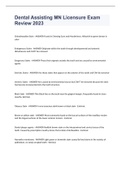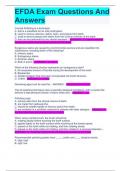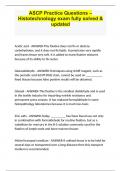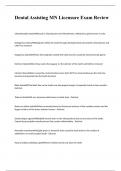Endogenous stains - Study guides, Class notes & Summaries
Looking for the best study guides, study notes and summaries about Endogenous stains? On this page you'll find 81 study documents about Endogenous stains.
Page 4 out of 81 results
Sort by
DASLE MN State Exam 2024 Latest Questions & Answers, Graded A+

-
Dental Assisting MN Licensure Exam Review 2023 with complete solutions
- Exam (elaborations) • 15 pages • 2023
-
- $9.49
- + learn more
Dental Assisting MN Licensure Exam Review 2023 Chlorahexadine Stain - ANSWER-Found in Chewing Gum and Mouthrinses, Yellowish to green brown in color Endogenous Stains - ANSWER-Originate within the tooth through developmental and systemic disturbances and CAN'T be removed Exogenous Stains - ANSWER-Those that originate outside the tooth and are caused by environmental agents Extrinsic Stains - ANSWER-Are those stains that appear on the exterior of the tooth and CAN be removed Int...

-
MN DASLE Questions and Answers | Latest Update
- Exam (elaborations) • 4 pages • 2024
- Available in package deal
-
- $9.89
- + learn more
Chlorahexadine Stain -:- Found in Chewing Gum and Mouthrinses, Yellowish to green brown Endogenous Stains -:- within the tooth through developmental and systemic disturbances. CAN'T be removed Exogenous Stains -:- originate outside the tooth caused by environmental agents Extrinsic Stains -:- exterior of the tooth and CAN be removed Intrinsic Stains -:- caused by environmental source CAN'T be removed incorporated into the tooth Black Stain 2 | P a g e | G r a d e A + | 2 0...

-
Histotechnology: Special Stains, etc. questions well answered graded A+
- Exam (elaborations) • 7 pages • 2023
- Available in package deal
-
- $12.99
- + learn more
Histotechnology: Special Stains, etc This is a stain for acid mucop olysaccharides and sialomucins. - correct answers Alcian blue This stains reacts with cations and is used to find calcium in tissue. - correct answers Alizaran Red S This stains uses ferric ions to demonstrate mucopolysaccharides and glycoproteins. Must be done at a low pH. - correct answers Colloidal iron In this stain, tissue is first treated with alkali to open up binding sites through the release of hydrogen bonds...

-
HTL Histotechnology: Special Stains fully solved rated A+
- Exam (elaborations) • 7 pages • 2023
- Available in package deal
-
- $12.99
- + learn more
HTL Histotechnology: Special StainsThis is a stain for acid mucopolysaccharides and sialomucins. - correct answers Alcian blue This stains reacts with cations and is used to find calcium in tissue. - correct answers Alizaran Red S This stains uses ferric ions to demonstrate mucopolysaccharides and glycoproteins. Must be done at a low pH. - correct answers Colloidal iron In this stain, tissue is first treated with alkali to open up binding sites through the release of hydrogen bonds. - c...

-
EFDA 2023 Exam Questions with Correct Answers
- Exam (elaborations) • 11 pages • 2024
-
Available in package deal
-
- $10.99
- + learn more
EFDA 2023 Exam Questions with Correct Answers Coronal Polishing is a technique: a. that is a substitute for an oral prophylaxis. b. used to remove calculus, debris, stain, and plaque from teeth. c. used to remove plaque and stains from the coronal surfaces of the teeth. d. that can be performed by any dental assistant. - ANSWER c. used to remove plaque and stains from coronal surfaces of the teeth. Exogenous stains are caused by environmental sources and are classified into subdivisi...

-
EFDA Exam Questions And Answers
- Exam (elaborations) • 11 pages • 2023
-
- $14.99
- + learn more
EFDA Exam Questions And Answers Coronal Polishing is a technique: A. that is a substitute for an oral prophylaxis. B. used to remove calculus, debris, stain, and plaque from teeth. C. used to remove plaque and stains from the coronal surfaces of the teeth. D. that can be performed by any dental assistant. - ANSWER C. used to remove plaque and stains from coronal surfaces of the teeth. Exogenous stains are caused by environmental sources and are classified into subdivisions, includin...

-
Dental Assisting MN Licensure Exam Review 2023 Edition.
- Exam (elaborations) • 11 pages • 2023
-
Available in package deal
-
- $9.99
- + learn more
Dental Assisting MN Licensure Exam Review 2023 Edition.Chlorahexadine Stain - ANSWER Found in Chewing Gum and Mouthrinses, Yellowish to green brown in color Endogenous Stains - ANSWER Originate within the tooth through developmental and systemic disturbances and CAN'T be removed Exogenous Stains - ANSWER Those that originate outside the tooth and are caused by environmental agents Extrinsic Stains - ANSWER Are those stains that appear on the exterior of the tooth and CAN be removed ...
Dental Assisting MN Licensure Exam Complete Review Questions and Answers 2024 Best Solutions

-
ASCP Practice Questions – Histotechnology exam fully solved & updated
- Exam (elaborations) • 11 pages • 2024
-
- $7.99
- + learn more
Acetic acid - ANSWER-This fixative does not fix or destroy carbohydrates, and it does not fix lipids. It penetrates very rapidly and leaves tissue very soft. It is added to many fixative mixtures because of its ability to fix nuclei. Glutaraldehyde - ANSWER-Techniques using Schiff reagent, such as the periodic acid-Schiff (PAS) stain, cannot be used on __________ fixed tissues because false positive results will be obtained. Glyoxal - ANSWER-This fixative is the smallest dialdehyde and is ...

How much did you already spend on Stuvia? Imagine there are plenty more of you out there paying for study notes, but this time YOU are the seller. Ka-ching! Discover all about earning on Stuvia




